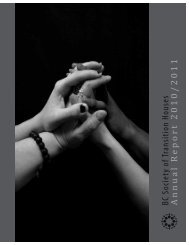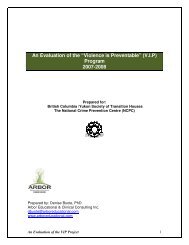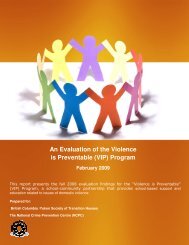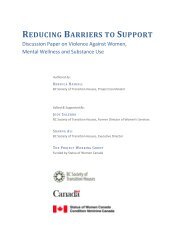a guide to supporting children exposed to domestic violence
a guide to supporting children exposed to domestic violence
a guide to supporting children exposed to domestic violence
You also want an ePaper? Increase the reach of your titles
YUMPU automatically turns print PDFs into web optimized ePapers that Google loves.
Tommy’s s<strong>to</strong>ry<br />
Tommy clung <strong>to</strong> his mother and wailed for at least an hour when she left him at<br />
daycare. He did not want <strong>to</strong> play, hid under a table, and tried <strong>to</strong> hit staff or other<br />
<strong>children</strong> when they approached him. He liked Ingrid, a quiet, gentle, patient worker.<br />
He would sit on her knee, sucking his thumb. Once he <strong>to</strong>ld her, “Mommy – hurt.”<br />
with another child. Toddlers are “egocentric.” This means that they think that they<br />
are most important and at the centre of everything. This explains why they don’t<br />
feel the need <strong>to</strong> share <strong>to</strong>ys, and have little understanding of other people’s<br />
feelings. (Some people think that abusers are still stuck at this stage!)<br />
When a woman is being abused and has a <strong>to</strong>ddler:<br />
• The <strong>to</strong>ddler may react by imitating the abusive behaviour that they are<br />
witnessing. This can include hitting and biting, hurting pets, screaming and<br />
yelling, and breaking <strong>to</strong>ys. The <strong>to</strong>ddler may be mimicking the abuser’s<br />
disrespectful attitude. If left alone <strong>to</strong>ddlers may hurt themselves or others.<br />
• The <strong>to</strong>ddler may react <strong>to</strong> the tension in the home by whining, clinging, crying,<br />
having eating or sleeping problems, or withdrawing.<br />
• Toddlers sometimes try <strong>to</strong> comfort themselves by rocking, sucking their thumbs,<br />
or <strong>to</strong>uching their private parts.<br />
• Sometimes the stress causes the child <strong>to</strong> get sick more often.<br />
PRESCHOOLERS<br />
Children between the age of three and five are still very dependent on their<br />
parents.<br />
Their parents care for them, give them hugs and encouragement, keep them safe,<br />
supervise their play, <strong>guide</strong> their interactions with other <strong>children</strong>, and help them<br />
learn the skills that they will need when they go <strong>to</strong> school.<br />
Parents are still playing a major role in shaping preschoolers’ behaviour by<br />
modelling, praising, encouraging, giving simple instructions, setting limits, and<br />
having basic rules.<br />
Children in this age group are able <strong>to</strong> speak and make others aware of their<br />
needs. They are or are about <strong>to</strong> be <strong>to</strong>ilet trained. They are learning the meaning<br />
HELPING MY CHILD A GUIDE TO SUPPORTING CHILDREN EXPOSED TO DOMESTIC VIOLENCE 17






